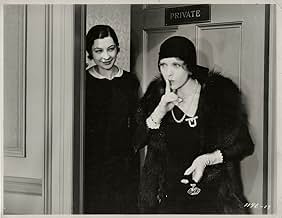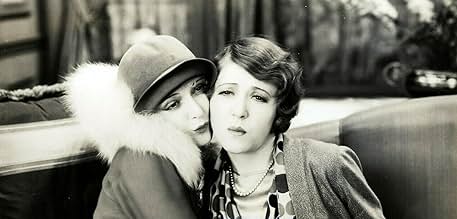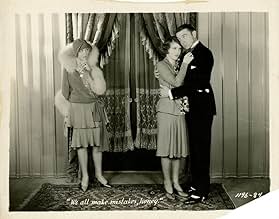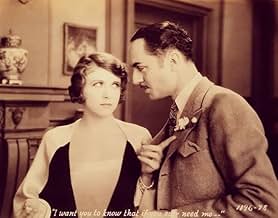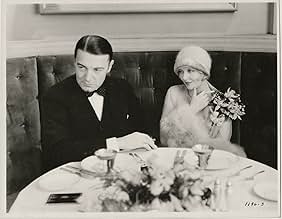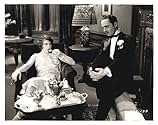AVALIAÇÃO DA IMDb
6,1/10
128
SUA AVALIAÇÃO
Adicionar um enredo no seu idiomaSet in London, Kathryn Miles's marriage is threatened when she discovers her husband's longstanding affair with her best friend but surprises everyone when she uses it to create a new life f... Ler tudoSet in London, Kathryn Miles's marriage is threatened when she discovers her husband's longstanding affair with her best friend but surprises everyone when she uses it to create a new life for herself.Set in London, Kathryn Miles's marriage is threatened when she discovers her husband's longstanding affair with her best friend but surprises everyone when she uses it to create a new life for herself.
- Direção
- Roteiristas
- Artistas
Avaliações em destaque
Clive Brook is married to Ruth Chatterton. He is carrying on an affair with Mary Nolan. She's married to Montagu Love, as well as being Miss Chatterton's best friend. The adulterers think they've got everyone fooled. But Miss Chatterton knows, and helps cover up for her husband when Love finds out. But she's not done with him.
It's the first sound version of Somerset Maugham's The Constant Wife, and it's played as one of those farces from a couple of decades earlier. Which is what it was. Brook, as usual, plays a stuffy stiff, while Miss Nolan is pretty and affects a French accent for some reason -- possibly to cover up her line readings, which rarely impress me in her talkies. Love is good, and so is William Powell, as a former suitor. But Miss Chatterton is excellent, playing the role as forthright and finding the evolving situation so amusing that she can''t keep a straight face.
As a movie it's not great. Victor Milner's camerawork is struck still, leaving the editing by Verna Willis to carry the burden. Which it doesn't really. Also, the copy I looked at was rather poor in the visuals, and hissy in the audio track. It required a good deal of patience to watch. In the end, though, Miss Chatterton made it worthwhile.
It's the first sound version of Somerset Maugham's The Constant Wife, and it's played as one of those farces from a couple of decades earlier. Which is what it was. Brook, as usual, plays a stuffy stiff, while Miss Nolan is pretty and affects a French accent for some reason -- possibly to cover up her line readings, which rarely impress me in her talkies. Love is good, and so is William Powell, as a former suitor. But Miss Chatterton is excellent, playing the role as forthright and finding the evolving situation so amusing that she can''t keep a straight face.
As a movie it's not great. Victor Milner's camerawork is struck still, leaving the editing by Verna Willis to carry the burden. Which it doesn't really. Also, the copy I looked at was rather poor in the visuals, and hissy in the audio track. It required a good deal of patience to watch. In the end, though, Miss Chatterton made it worthwhile.
Despite their occasional creakiness, I'm a great fan of the early talkies. This one, however, is not only creaky but downright inept in every department, save one -- acting. In the acting division, thanks to the sterling efforts of Mary Nolan, Montagu Love and William Powell (in a very small, if important role), it's only 90% rotten. Clive Brook gives such a bad performance, one contemporary reviewer assumed he was playing the butler and wrote a tongue-in-cheek critique accordingly. Sad to say that while Brook plumbs the depths of ineptitude, Miss Chatterton and Miss Crews do not exactly shine either, although it's tempting to blame their staginess on the extremely static yet over-emphatic direction they obviously received from Robert Milton. As a result, the Somerset Maugham comedy-of-manners comes across with all the wit of a turkey's egg. Sparse production values and hole-in-the-wall photography don't help either.
Watch it for the clothes and the manners. It is a comedy of manners, and the sets are delicious. Before the Crash...
Hollywood recycles 1926 hit play by Somerset Maugham, THE CONSTANT WIFE. Watch out, these people are still basically Edwardians. Americans "set in London" except Clive Brook, veddy English. An incredibly stiff young William Powell, a serviceable dandy. And Ruth Chatterton in the role of the wronged wife who's wise enough to use guerilla tactics. Laura Hope Crews as her Mother is a fascinating relic of a distant age.
Not for the faint of heart who must see a car explode every 5 minues. The tensions here are emotional and erotic, something Americans have mostly had beaten out of them.
Not for the faint of heart who must see a car explode every 5 minues. The tensions here are emotional and erotic, something Americans have mostly had beaten out of them.
Charming Sinners is the second dialogue film based on the work of England's Somerset Maugham. The film was something new for the cinema. It was not about action. It was about words—expertly delivered by a well-seasoned cast. Clive Brook, Montague Love, and William Powell had been stage veterans since the 1910's. Ruth Chatterton and Laura Hope Crews (who plays her mother) had worked together for years in the Henry Miller Company. Charming Sinners was perfect turf for Chatterton, who dominates the picture and delivers with poignancy and bite.
Chatterton, as the wife of an errant husband (Clive Brook, appropriately stiff and full of himself), opts for the single standard with the sole purpose of getting him back. Enter the polished William Powell, a former beau who is still in love with her. Together, they have much more chemistry. There is an exquisite musical interlude at the piano. While Chatterton plays and sings a wistful melody, Powell pours his heart out. She dismisses his ardor with an appreciative laugh. The question is: will Ruth take a vacation from marriage and rendezvous with Powell in Italy? Although the film ends differently from the stage production, it is an effective, thoughtful finish for an engaging frolic amongst the upper-crust.
Filmed in early 1929, critics were impressed by the film and its players, but complained about the sound quality. It was shot in the wee hours of the morning (typical of early sound features), and it's a marvel that the players pulled off such an amusing piece of work. Robert Milton and Dorothy Arzner co-directed the film. It must be pointed out that the tragic Mary Nolan, the only non-stage veteran (except the Ziegfeld Follies), is excellent as the pampered schemer with whom Brook is smitten. Always thinking and plotting, she turns her distasteful character into something peculiarly fascinating. She proved that some silent stars didn't need to fear the influx of stage veterans with the advent of sound film.
Chatterton, as the wife of an errant husband (Clive Brook, appropriately stiff and full of himself), opts for the single standard with the sole purpose of getting him back. Enter the polished William Powell, a former beau who is still in love with her. Together, they have much more chemistry. There is an exquisite musical interlude at the piano. While Chatterton plays and sings a wistful melody, Powell pours his heart out. She dismisses his ardor with an appreciative laugh. The question is: will Ruth take a vacation from marriage and rendezvous with Powell in Italy? Although the film ends differently from the stage production, it is an effective, thoughtful finish for an engaging frolic amongst the upper-crust.
Filmed in early 1929, critics were impressed by the film and its players, but complained about the sound quality. It was shot in the wee hours of the morning (typical of early sound features), and it's a marvel that the players pulled off such an amusing piece of work. Robert Milton and Dorothy Arzner co-directed the film. It must be pointed out that the tragic Mary Nolan, the only non-stage veteran (except the Ziegfeld Follies), is excellent as the pampered schemer with whom Brook is smitten. Always thinking and plotting, she turns her distasteful character into something peculiarly fascinating. She proved that some silent stars didn't need to fear the influx of stage veterans with the advent of sound film.
"Charming Sinners" may be ancient in age (and the sound is often problematic, making some of the dialogue hard to hear) but it's quite modern and sophisticated in its attitudes towards marital infidelity and gender equality. Thematically, it's rather similar to Norma Shearer's "The Divorcee", which it precedes by a year. Not funny enough to be a comedy, and not dramatic enough to be a drama, but it does feature some very good acting - Ruth Chatterton is simply splendid (especially when she smiles), the little-known Mary Nolan is cute, and William Powell has a small, typically suave role. **1/2 out of 4.
Você sabia?
- CuriosidadesA nitrate print of this film survives in the UCLA Film and Television Archives.
- ConexõesReferenced in Fui Reprovado, Mas... (1930)
Principais escolhas
Faça login para avaliar e ver a lista de recomendações personalizadas
Detalhes
- Data de lançamento
- País de origem
- Idioma
- Também conhecido como
- Charming Sinners
- Locações de filme
- Empresa de produção
- Consulte mais créditos da empresa na IMDbPro
- Tempo de duração
- 1 h 6 min(66 min)
- Cor
- Proporção
- 1.20 : 1
Contribua para esta página
Sugerir uma alteração ou adicionar conteúdo ausente

